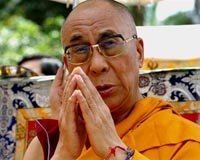 |
Tawang, India (AFP) Nov 8, 2009 The Dalai Lama visited a remote Tibetan monastery in northeast India on Sunday at the start of a trip that has infuriated China, which claims the surrounding Himalayan region as its own. Thousands of Buddhists gave the Tibetan spiritual leader, who has lived in exile in India for 50 years, a rousing welcome as he arrived at the Tawang monastery, perched at 3,500 metres (11,400 feet) in Arunachal Pradesh. "We are very pleased and blessed to have His Holiness here," said Sarwang Lama, a monk wearing a new maroon robe, as Tibetan prayer flags fluttered in the cold mountain air and posters of the Dalai Lama adorned walls and rooftops. The Nobel laureate smiled and waved to excited crowds of devotees, and said he was "very happy" to be in Tawang. Sandwiched between Myanmar, Bhutan and Tibet, the state of Arunachal is governed by India but claimed by China. Beijing has called the visit a provocation aimed at harming relations between China and India. Tawang -- 400 years old and the second largest Tibetan monastery in India -- holds strong memories for the Dalai Lama. When he fled Tibet following a failed uprising against Chinese rule, Arunachal was his point of entry to India and he took refuge in Tawang at the start of his decades in exile. "There are a lot of emotions involved," he said, looking back. "When I escaped from China in 1959, I was mentally and physically very weak. "The Chinese did not pursue us in 1959, but when I reached India they started speaking against me." Preparations for his week-long tour of Arunachal have been underway for two months, with many buildings receiving a fresh coat of paint and regular prayers held for his safe journey. "It was a lifetime experience to have seen the Dalai Lama from so close," said a young monk called Sherbu on Sunday. "He waved back at us and I consider this to be a blessing for me and the people here." It was not the Dalai Lama's first return visit to Tawang but the timing has caused Beijing to protest in a stronger fashion than in the past. Indo-Chinese tensions over their disputed Himalayan border -- the cause of a brief but bloody war in 1962 -- have risen in recent months, with reports of troop movements and minor incursions on both sides. Indian Prime Minister Manmohan Singh toured the state last month during an election campaign, prompting warnings from Beijing about harming bilateral ties. The presence in the disputed region of the Dalai Lama, whom China regards as a "splittist" intent on fomenting separatist unrest in his homeland, is seen as a double insult. China accused the Dalai Lama and his exiled "clique" of helping to organise anti-China protests that erupted in the Tibetan capital Lhasa in March last year and spread across the Tibetan plateau. India has strongly defended the Dalai Lama as an "honoured guest", but commercial links have strengthened between the two booming Asian giants and their leaders have vowed to solve disputes peacefully. "It is quite usual for China to step up campaigning against me wherever I go," the Dalai Lama told reporters after opening a museum at the monastery. "It is totally baseless on the part of the Chinese communist government to say that I am encouraging a separatist movement. "My visit to Tawang is non-political and aimed at promoting universal brotherhood and nothing else." Phuntso Wangchuk, an 80-year-old who lives near Tawang and remembers the excitement that greeted the Dalai Lama's escape from Tibet, said Chinese criticism was misplaced. "A mentor can visit anywhere to bless his disciples," Wangchuk said. The Dalai Lama's itinerary will focus on religious teaching, but China will see a possible ulterior motive. He is 74 and has had several recent health scares, fuelling speculation over his reincarnation and successor. China is almost sure to make its own selection. The Dalai Lama, however, has stated that his reincarnation may be found outside Chinese Tibet, and Arunachal, with its rich Tibetan culture, is an obvious contender. The Dalai Lama admitted Tibetan Buddhism was "passing through a very difficult period" but said that he drew hope from vibrant communities such as Tawang. After staying at the monastery, he will visit other towns in the region before departing next Sunday. Share This Article With Planet Earth
Related Links China News from SinoDaily.com
 Dalai Lama trip strains India-China ties
Dalai Lama trip strains India-China tiesNew Delhi (AFP) Nov 5, 2009 Twin thorns in the side of India-China relations will get a simultaneous tweak this weekend when the Dalai Lama visits a Buddhist region at the heart of a border row between the Asian giants. Sandwiched between Myanmar, the kingdom of Bhutan and Tibet, the lush, forested state of Arunachal Pradesh in the Himalayan foothills is governed by India but claimed by China. Beijing tends to view ... read more |
|
| The content herein, unless otherwise known to be public domain, are Copyright 1995-2009 - SpaceDaily. AFP and UPI Wire Stories are copyright Agence France-Presse and United Press International. ESA Portal Reports are copyright European Space Agency. All NASA sourced material is public domain. Additional copyrights may apply in whole or part to other bona fide parties. Advertising does not imply endorsement,agreement or approval of any opinions, statements or information provided by SpaceDaily on any Web page published or hosted by SpaceDaily. Privacy Statement |